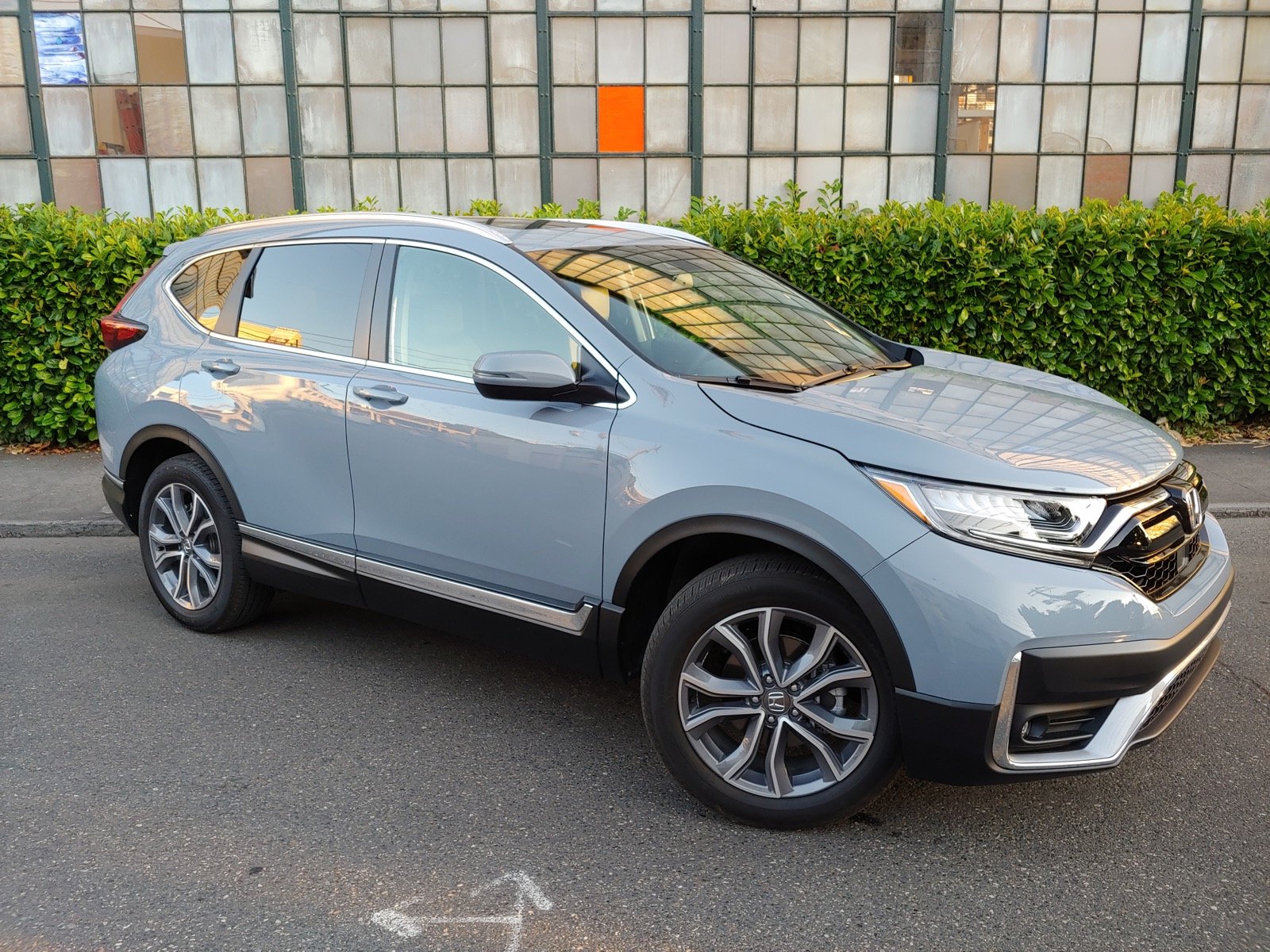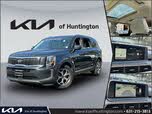2020 Kia Telluride vs 2020 Honda CR-V
Overview | ||
MSRP | $31,890 | $25,150 |
Average price | $23,216 | $23,838 |
Listings | ||
Ratings & Reviews | ||
User reviews | ||
Expert reviews | 8.3 out of 10Read full review | 7.5 out of 10Read full review |
Pros & cons | Pros
| Pros
|
Summary | Usually, when I step out of an SUV and feel great, there's a luxury nameplate on the tailgate. Not this time. The Telluride grabbed me from the moment my white-over-grey test car arrived. And after 500 miles, the Telluride proved how impressive it is against every SUV in the $30,000 to $50,000 range. Kia hasn't made a truly big SUV since the 2009 Borrego, which it quickly canceled after bad reviews while a nation reeled from record-high gas prices. The smaller Sorento took over as Kia's 3-row SUV, except it wasn't roomy enough for six or seven people (and still isn't). That's not to say we don't like the Sorento—it's one of our highest-rated cars—but for families who want the most space, technology, and amenities, the 2020 Telluride is Kia's new champ. | Honda’s compact SUV has been satisfying buyers for more than two decades, with more than five million CR-V’s sold. Such a legacy means the CR-V has long had its wrinkles smoothed out into a comfortable and capable crossover package that’s only downside may be its sheer inoffensiveness. This year’s model gets engine and safety upgrades, which improve fuel economy and help to make Honda’s bestseller an even better value. |
Video | No video found | |
Popular Features & Specs | ||
Engine | 3.8L 291 hp V6 | 1.5L 190 hp I4 |
Drive Train | FWD | FWD |
Seating Capacity | 8 | 5 |
Horsepower | 291 hp @ 6000 rpm | 190 hp @ 5600 rpm |
MPG City | 20 | 28 |
MPG Highway | 26 | 34 |
Engine | ||
Engine Name | 3.8L 291 hp V6 | 1.5L 190 hp I4 |
Torque | 262 lb-ft @ 5200 rpm | 179 lb-ft @ 2000 rpm |
Horsepower | 291 hp @ 6000 rpm | 190 hp @ 5600 rpm |
Drivetrain | FWD | FWD |
Fuel Economy | ||
MPG City | 20 | 28 |
MPG Highway | 26 | 34 |
Interior | ||
Seating Capacity | 8 | 5 |
Safety | ||
Front Crash Overall | 4 | 5 |
Side Crash Overall | 5 | 5 |
Dimensions & Capacity | ||
Cargo Space | 21.0 cu ft | 39.2 cu ft |
Curb Weight | 4112 lbs | 3337 lbs |
Height | 68.9 in | 66.1 in |
Length | 196.9 in | 182.1 in |
Width | 78.3 in | 73.0 in |
Wheelbase | 114.2 in | 104.8 in |
Maximum Payload | 1664 lbs | 1358 lbs |
Number of doors | 4 | 4 |
Maximum Towing Capacity | 5000 lbs | 1500 lbs |
The 2020 Kia Telluride marked a significant departure from Kia's earlier reputation for producing merely adequate, budget-friendly cars. Kia had put immense effort into erasing these old perceptions, and the Telluride came across as much more expensive than its actual cost, largely due to its sophisticated design language. Despite the impressive aesthetics, the oversized Kia logo on the front grille—reminiscent of an older era—didn’t quite match the Telluride’s modern, upscale appeal.
Visually, the Telluride stood out for its handsome, SUV-meets-luxury look. It sported a boxy yet fluid design, blending a big Chevy’s robustness with a Volvo's sleek lines. The front of the Telluride featured upright, rectilinear themes, including vertical headlights and a balanced grille design. The shoulder line along the vehicle’s side added a touch of Volvo-esque sophistication. Its high, yet non-dominating hood encapsulated a design that promised longevity. Special elements like amber LED running lights doubling as turn signals and distinctive, thin taillights that echoed hockey sticks further enriched its appearance. The Telluride’s large, capital "TELLURIDE" badges gave off a luxe vibe akin to high-end British SUVs, cementing its unique identity in a crowded market.
Inside, the Telluride's interior could easily be mistaken for that of a Mercedes-Benz GLE-Class, with its high-quality twin grab handles, airflow vents, and ultra-wide touchscreen. Matte wood, silver-painted buttons, and knurled metal knobs contributed to an expensive feel, although some materials like the faux wood and the lower dash’s hard plastic revealed its true cost-efficiency. Lower trims reduced the opulence somewhat, but still provided a welcoming, high-quality environment. The SX-trim, particularly with the Prestige Package, added luxurious elements like Nappa leather seats and a soft headliner, fooling many into thinking the vehicle's cost was significantly higher than its actual $46,930 price tag.
Comparatively, the fifth-generation 2020 Honda CR-V maintained a familiar and appealing design. Honda’s designers leaned towards softer, car-like curves, giving the CR-V a front and rear fascia that resembled the sedan lineup. Despite its SUV designation, the CR-V could easily be mistaken for an upgraded station wagon, a design choice that favored family-oriented practicality over rugged aesthetic appeal.
Inside, the CR-V suffered from a somewhat discordant mix of materials. Though certain elements, such as the wood-look trim and leather upholstery in higher trims, appeared upscale, they contrasted sharply with the cheaper plastic materials. This dichotomy emphasized the CR-V’s roots as an upgraded commodity car rather than a luxury product.
Performance-wise, the 2020 Kia Telluride came with a robust 3.8-liter V6 engine generating 291 horsepower and 262 pound-feet of torque. Power was channeled through an 8-speed automatic transmission, available in both FWD and AWD (the latter costing an additional $2,000). Despite an absence of paddle shifters, manual gear shifts were possible via the gear selector, and a Sport mode offered improved response. Nonetheless, there were concerns about transmission delays and rough shifts, particularly under aggressive acceleration.
Despite these drawbacks, the Telluride’s power was sufficient to move its substantial two-and-a-quarter-ton frame efficiently. Braking was strong, and the pedal felt firm. However, the steering was slow with noticeable body lean, differentiating it from luxury SUVs that offered superior agility and precision. The upside was a supremely smooth ride, aided by acoustic insulation and double-paned glass that significantly reduced wind noise. For off-road enthusiasts, the Telluride offered an axle-lock feature for a 50-50 power split between front and rear and a snow mode to optimize transmission settings in slippery conditions.
Towing capacity for the Telluride was 5,000 pounds, matching the Honda Pilot but requiring an additional $795 Towing package. Fuel economy was respectable but not outstanding, with EPA ratings of 19 mpg city, 24 highway, and 21 combined for AWD models (20/26/23 for FWD).
In contrast, the 2020 Honda CR-V featured a single engine option: a 1.5-liter turbocharged four-cylinder producing 190 horsepower and 179 pound-feet of torque, paired with a CVT. This engine had replaced the previously available 2.4-liter four-cylinder engine, simplifying the lineup. Honda's CVT provided smooth and efficient power delivery, avoiding the notorious sluggishness and high-rev droning associated with older CVT models. Sport mode added a touch of liveliness to the driving experience, making the CR-V feel quite responsive.
The CR-V's road manners were excellent, exhibiting car-like driving dynamics with well-weighted steering and nimble handling. While not sporty, the CR-V’s chassis was firm yet comfortable, offering minimal body roll and a level of agility aided by its low curb weight of 3,337 pounds for the FWD LX model.
Fuel economy was a strong suit for the CR-V, with FWD models achieving an EPA rating of 30 mpg combined and AWD variants managing 29 mpg. These figures placed the CR-V at the top of its class, surpassing its competitors in fuel efficiency.
Seating up to eight passengers (depending on trim), the 2020 Kia Telluride offered options for different configurations, with the higher trims featuring seven-passenger seating with captain’s chairs in the second row. These seats, particularly in the SX trim, came with heating, cooling options, and manual side-window shades. With an abundance of USB ports, air vents, and cupholders, the Telluride ensured that every passenger’s comfort was prioritized. The second-row seats provided generous legroom and could fold flat to expand cargo capacity, which ranged from 21 cubic feet with all seats up to 87 cubic feet when folded flat.
The Telluride's interior featured analog gauges and a combination of buttons, knobs, and toggle switches, all arranged with precision. The standard screen size was 8 inches, upgradeable to a 10.3-inch display on higher trims, accompanied by a 7-inch instrument panel screen in the SX, which offered a richer set of information.
In comparison, the 2020 Honda CR-V leveraged Honda’s legendary packaging prowess to maximize interior space efficiently. Offering generous head- and legroom, the CR-V ensured comfort in both the passenger and driver’s seats, partly due to an ideal seating position that enhanced visibility. The cargo area was impressively roomy, with a total of 75.8 cubic feet of space when the rear seats were folded, thanks to a smart two-position load floor that allowed for versatile cargo and storage management.
Practical features abounded in the CR-V’s interior, from a deep center console bin influenced by the Honda Odyssey to large door pockets for additional storage. These features underscored the CR-V’s ease of use and family-friendly design.
When comparing cargo capacities, the Telluride edged out with more cubic feet of space, offering greater flexibility for large families or those needing extra room for outdoor equipment and luggage.
Technology in the 2020 Kia Telluride was plentiful. Standard features included Apple CarPlay, Android Auto, and Kia's UVO link, which enabled remote car location and unlocking via an app. Upper trims equipped with navigation benefited from accurate voice inputs for destinations and online search capabilities, similar to Google Maps. However, the Telluride lacked onboard WiFi, a curious omission given its built-in cellular modem.
Innovative tech included a live feed of your left or right blind spot on the instrument cluster in the SX trim, while Kia’s Highway Driving Assist provided semi-autonomous driving support in limited situations. Additional convenience features like a quiet mode and driver intercom to the third row were also available.
The Telluride’s SX trim boasted impressive standard features such as bright LED headlights, dual moonroofs, and a high-fidelity Harman Kardon surround stereo system. The standard audio setup with six speakers fell short for a vehicle of its size.
In stark contrast, the 2020 Honda CR-V’s technology offerings were dated. The base LX trim came with merely a 5-inch screen, offering limited functionality. Even the 7-inch touchscreen in higher trims seemed small compared to competitors. The CR-V’s infotainment system lacked hard buttons, making it cumbersome to operate and difficult to navigate effectively. Apple CarPlay and Android Auto, available on higher trims, felt unintegrated, while the Honda navigation system was less reliable than smartphone-based alternatives.
Honda did, however, ensure ample USB ports in the EX trim and above, with two high-powered ports in the backseat and a wireless phone charger in the Touring trim.
The 2020 Kia Telluride was packed with safety features, anticipating high scores from future crash tests by the NHTSA and IIHS. Standard features included forward-collision alert with automatic emergency braking and pedestrian detection, blind-spot monitoring with rear cross-traffic alert, lane-keep assist, and adaptive cruise control. The Telluride also introduced Safe Exit Assist, preventing doors from opening if an oncoming vehicle was detected. Optional features included surround-view cameras and front parking sensors. The vehicle had a driver’s knee airbag, although the front passenger lacked this feature.
The 2020 Honda CR-V also excelled in safety, featuring the “Honda Sensing” system standard across all trims. This included forward-collision warning with automatic emergency braking, pedestrian detection, road-departure mitigation, and adaptive cruise control with lane-keeping assist. Blind-spot monitoring and cross-traffic monitoring were reserved for the EX trim and above. Standard safety equipment such as stability control, LATCH anchors for car seats, and airbags were all included.
In crash testing, the CR-V earned top marks from both the NHTSA (with a five-star rating) and the IIHS, although lower trims fell short due to less effective halogen headlights compared to the Touring model’s LEDs.
CarGurus highlights

According to CarGurus experts, the overall rating for the 2020 Kia Telluride is 8.3 out of 10, while the 2020 Honda CR-V scores 7.5 out of 10. The Telluride stands out for its upscale design, luxurious and spacious interior, and advanced technology and safety features, making it the superior choice for those seeking a well-rounded SUV experience. While the CR-V remains a solid, practical, and efficient vehicle, the Telluride’s higher overall rating reflects its superior blend of style, performance, and family-friendly amenities.
Choose the 2020 Kia Telluride if:
Shop Now- You prioritize a spacious, luxurious interior with high-quality materials.
- You need substantial cargo space and passenger comfort for large families.
- Advanced technology and a comprehensive suite of safety features are important to you.
Choose the 2020 Honda CR-V if:
Shop Now- You prefer a more compact and fuel-efficient vehicle.
- Practicality and everyday usability with clever storage solutions are your priority.
- A longstanding, reliable brand with top safety ratings is crucial.

By: CarGurus + AI
At CarGurus, our team of experienced automotive writers remain at the heart of our content operation, conducting hands-on car tests and writing insightful guides that are backed by years of industry experience. To complement this, we are harnessing AI to make our content offering more diverse and more helpful to shoppers than ever. To achieve this, our AI systems are based exclusively on CarGurus content, ratings and data, so that what we produce is both unique to CarGurus, and uniquely helpful to car shoppers.































